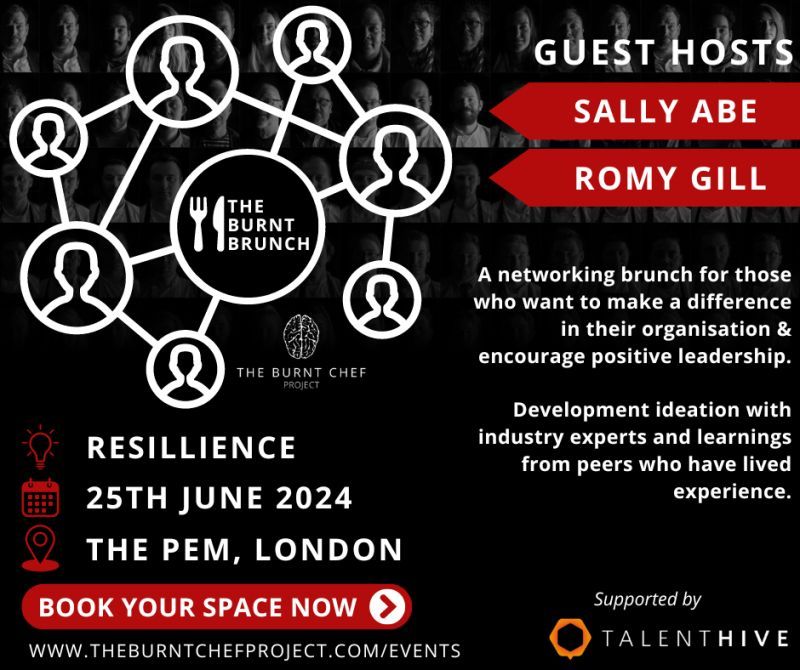As a proud partner of The Burnt Chef Project (TBCP) – a non-profit social enterprise which aims to raise awareness of mental health issues within hospitality across the world – and a sponsor of the first two bunches in its newly launched Burnt Brunch series, we were excited to attend the inaugural brunch last month, hosted at The Pem in London.
The event focusing on resilience within hospitality treated us to an exceptional panel of guest speakers including Sally Abe, author and consultant chef at The Pem and Romy Gill MBE, chef, food writer, author and broadcaster. They were joined by The Burnt Chef Project’s Mica Maurtua and hosted by journalist and The Burnt Chef Ambassador, Cara Houchen.
There’s no doubt that deciding to follow a career in hospitality requires resilience and quite often a thick skin, but the Burnt Brunch delved a little deeper into what resilience really means, how to thrive in challenging situations and how to identify when the lines blur between being resilient and simply coping.
Following The Burnt Brunch we wanted to share our top five learnings from the event:
- Resilience shouldn’t come at the cost of your mental health. Developing the capacity to withstandor to recover quickly from difficulties is vital in the hospitality industry, so it was no surprise that both Sally and Romy discussed the need to have a thick skin to thrive. That said it’s important to acknowledge when your resilience is being tested more than it should and that it is taking a toll on your mental health. “That’s the time you need to ask for help” says Sally, “it is out there, we actually work in a really welcoming industry, so don’t be afraid to say when it’s all got a little bit too much”. And that’s exactly where initiatives like the Burnt Chef Project come into their own.
- Perspective is a massive part of building resilience. The panel discussed the idea of ‘what won’t matter in five years shouldn’t matter for more than five minutes’ and while we appreciate that might not quite work in reality it is a helpful notion to put into perspective some of the challenging situations that are faced both front and back of house. The way we approach a situation can also hugely affect the outcome. Shifting our perspective can be beneficial here. For example, while in an ideal world we would never have to deal with customer complaints it is an inevitable part of this customer focused industry. However, Sally recommended that rather than taking complaints personally, look at them as an opportunity to learn and improve for next time.
- Find a good mentor. No man (or woman) is an island and this is especially true of hospitality. Both Romy and Sally spoke of the importance of finding a good mentor, someone who has experience of the challenges you’re likely to face and so is well placed to help offer solutions that you might not be able to in the heat of the moment.
- Make time for yourself. Passion for your profession can often mean it’s prioritised above everything else, but it is important to take time for yourself to avoid burnout and ensure you take the best version of you to work. Whether that’s a yoga class, a walk with your dog or ½ an hour to read a book – dedicated ‘me time’ is important.
- It’s ok to say no. This is one that can be easier said than done, especially early on in your career and you’re eager to please. But, taking on more than you can realistically achieve not only impacts your team and customer experience but your own wellbeing both physically and mentally. So, it is important to know that you can say ‘no’.
Thank you to The Burnt Chef Project for hosting such an insightful and engaging session, we’re looking forward to the second one at Simpsons Restaurant in Birmingham on 22nd July.
The second Burnt Brunch is in collaboration with Luke Tipping and Louisa Ellis. The pair, along with our own Managing Director, Will Gennard, will be discussing how the Gen Z generation approaches the industry, a topic not only incredibly relevant to the industry right now, but one that really resonates with Talent Hive.
